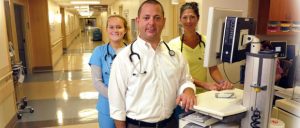A colonoscopy could save your life. Experts say not to be too concerned about potential discomfort or dietary restrictions that come along with colorectal cancer screenings because most patients are sedated and have no memory of the experience.
The American Cancer Society estimates that 151,030 adults will be diagnosed with colorectal cancer in the U.S. in 2020, and that it will claim the lives of 52,580 patients. NEWS10 spoke with Doctor Joseph Choma, a gastroenterology specialist at Saint Peter’s Health Partners.
He said colorectal cancer is more common than people realize. “It’s the third most common cancer for men and the second most common cancer for women,” Choma said. “Fortunately, when colon cancer is detected at an early stage it has a very very high cure rate.”
The U.S. Preventive Services Task Force lowered the recommended age to start colorectal screenings from 50 to 45-years-old in May 2021. Dr. Choma said this is important, as people can have polyps or colorectal cancer and not even know it.
According to the CDC, research shows that screenings can prevent colorectal cancer. However, screening rates are still too low in the U.S. Only 65% of adults between the ages of 50 to 75 are up to date with their colorectal cancer tests.
During a colonoscopy, most polyps can be removed and prevent cancer from forming. The result from your last screening will determine how often you need to get screened for colorectal cancer. For most adults, screening is recommended every 10 years.
While colonoscopies are the most sensitive tests currently available for colon cancer screenings, stool DNA tests and fecal occult blood tests are other screening options depending on your doctor’s recommendation.
https://www.news10.com/news/womens-health-wednesday-colorectal-cancer-screenings-save-lives/



